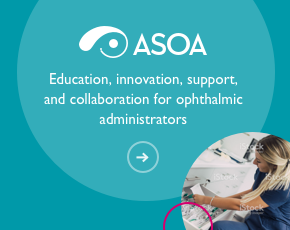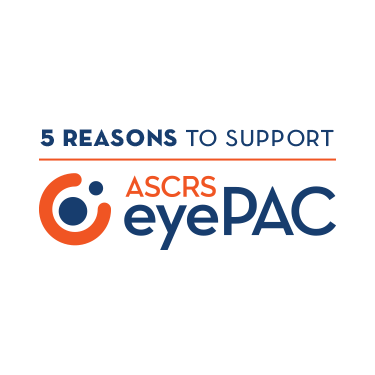Claim Credits for the 2024 ASCRS Annual Meeting
The online evaluation site for the 2024 ASCRS Annual Meeting is closed. To claim CME credit for 2024 ASCRS Annual Meeting or 2024 ASCRS Subspecialty Day, please complete the ASCRS CME Credit Request Form.
ASCRS CME Request Form
2024 ASCRS Annual Meeting Certificate of Attendance (No Credit)
To receive a Certificate of Attendance, visit the Registration Resource Center, log in using your Badge ID and email address associated with your meeting registration, and select the Certificate of Attendance button.
ASCRS Annual Meeting Continuing Medical Education
ASCRS’ CME Mission Statement
ASCRS’ continuing medical education mission is to improve the competence of ophthalmologists/anterior segment surgeons by offering an avenue for the presentation and discussion of innovative techniques and technologies and fostering an open environment where current practices are presented and questions and improvements in patient care are continually sought.
Accreditation Statement
The American Society of Cataract and Refractive Surgery is accredited by the Accreditation Council for Continuing Medical Education to provide continuing medical education for physicians. ASCRS takes responsibility for the content, quality and scientific integrity of the CME activity.
Designation Statement
The American Society of Cataract and Refractive Surgery designates the ASCRS and ASOA Programs within the ASCRS ASOA Annual Meeting for a maximum of 32 AMA PRA Category 1 Credits™. Physicians should only claim credit commensurate with the extent of their participation in the activity.
All CME activities approved for AMA PRA Category 1 Credit™ are valid for recognition by the European Accreditation Council for Continuing Medical Education (EACCME). Physicians not licensed in the U.S. who participate in this CME activity are eligible for AMA PRA Category 1 Credit™.
Physicians can claim CME credit up to the maximum listed above for attending the Physicians Program (ASCRS), including scientific films and posters on-demand, scientific papers, courses, symposia and general sessions). Attendees registered as exhibitors, spouses, and guests are not eligible for CME credits. Note: All attendees must have their badges visit a badge verification station to be eligible to claim credits and evaluate the program.
Attendees registered as exhibitors, spouses, and guests are not eligible for CME credits.
ASCRS Annual Meeting Educational Objectives
Upon completion of the ASCRS Annual Meeting, participants should be able to:
- Recognize and discuss current and advanced treatment strategies for anterior segment surgery, and corneal, glaucoma and retinal conditions.
- Identify the latest developments and advances in techniques and technology within anterior segment surgery and comprehensive ophthalmology.
- Identify complicating factors in anterior segment surgery and develop appropriate treatment plans.
- Practice hands on surgical skills and techniques in Skills Transfer Labs.
- Examine external legislative issues and internal business practice issues affecting the field of ophthalmology.
Notice About Off-Label Use Presentations
The ASCRS ASOA Annual Meeting may include presentations on drugs or devices, or uses of drugs or devices that may not have been approved by the Food and Drug Administration (FDA) or have been approved by the FDA for specific uses only. The FDA has stated that it is the responsibility of the physician to determine the FDA clearance status of each drug or device he or she wished to use in clinical practice.
ASCRS is committed to the free exchange of medical education. Inclusion of any presentation in this program, including presentations of off-label uses, does not imply an endorsement by ASCRS of the uses, products, or techniques presented.
Disclosure of Financial Interest
All faculty members are required to disclose whether they, or their spouses, have any financial interest (or lack thereof) from the past 24 months with a company that produces, markets, resells or distribute ophthalmic products or services consumed by, or used on, patients. Faculty members are also required to disclose such information verbally and on their first slide.
ASCRS considers presenting authors, no co-authors, to be in control of the educational content. As a professional courtesy, ASCRS acknowledges co-authors and all people contributing to the research, regardless of CME control of the live presentation of that content. Though they are acknowledged, co-authors do not have control of the CME content and their disclosures are not published or resolved.
Presenter Disclosures
It is an ASCRS requirement that all presenters disclose on the first slide and verbally at the beginning of any presentation whether they have any relevant financial interests from the past 24 months. Presenters are expected to give a fair and balanced presentation.
Control of Content
ASCRS considers the following to be in control of CME educational content:
- Planners, presenters, moderators and panelists for General Sessions and Symposia
- Lead instructors and co-instructors for instructional courses
- Lead authors/presenters of scientific papers
- Lead authors of scientific posters
- Lead creators/presenters of scientific films
- Leaders of Expert Roundtable Sessions
CME Credit Questions
Send questions on CME credit claiming to cme@ascrs.org.
ASCRS Subspecialty Day Continuing Medical Education
ASCRS Cornea Day
Target Audience
Practicing ophthalmologists who care for patients with
corneal-related conditions.
Educational Objectives
- Describe updates in surgical cornea—management of Fuchs dystrophy, posterior lamellar keratoplasty updates, keratoprosthesis, and emerging technologies.
- Discover treatment options for management of corneal infections and chronic corneal inflammatory disorders.
- Employ strategies for managing complex cornea cases in treating complex IOL cases, open sky, complex EK, and artificial irises.
- Discuss office-based corneal disease management, to include the management of keratoconus, corneal collagen crosslinking, herpes eye disease, and infectious keratitis.
- Examine current research related to the etiology and treatment of ocular surface diseases.
- Develop strategies to identify and efficiently manage patients with severe ocular surface disease, dry eye disease, and surface neoplasias.
ASCRS Glaucoma Day
Target Audience
Practicing ophthalmologists who care for patients with
glaucoma-related conditions.
Educational Objectives
- Effectively evaluate current and new diagnostic testing modalities to assist in the early diagnosis of the glaucoma patient and glaucoma suspect as well as disease progression.
- Make treatment decisions using evidence-based recommendations regarding the use of medical and laser therapies for the treatment of glaucoma.
- Evaluate best phacoemulsification treatment options and considerations for patients with complex, pre-existing, and advanced glaucoma.
- Discuss recent and emerging microinvasive glaucoma surgical (MIGS) options.
- Integrate pearls to improve glaucoma surgical outcomes. Implement strategies to manage glaucoma surgical outcomes.
ASCRS Refractive Day
Target Audience
This educational activity has been designed for anterior
segment surgeons and comprehensive ophthalmologists.
Educational Objectives
- Review skills needed during preoperative assessment for insightful patient selection and effective patient counseling to ensure patient satisfaction and expectations for the future.
- Examine how different diagnostics help guide preoperative decisions and patient conversations and how refractive surgery procedures have evolved.
- Explain the impact of presbyopia and compare the current options available.
- Compare and contrast all new technologies available in refractive cataract surgery.
- Demonstrate how to approach patients with varied ocular conditions to increase their understanding, expectations, and satisfaction with their refractive procedure.
- Discuss how to help manage unhappy postop refractive cataract surgery patients.
- Discuss audience response questions with panel.



